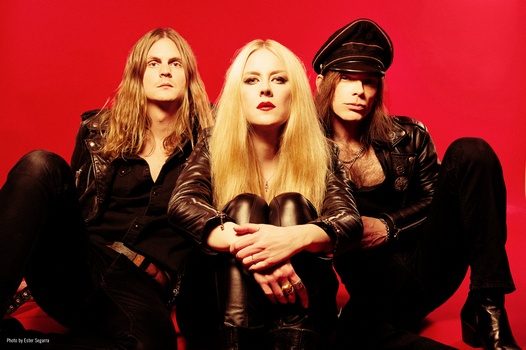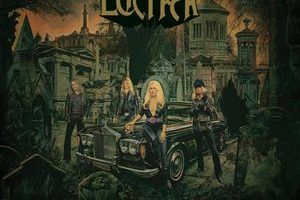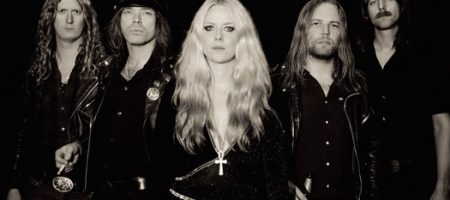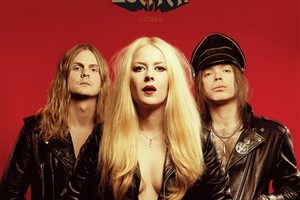Lucifer – Reimagining Doom
Tuesday, 24th July 2018
Coming in hot from The Oath, Johanna Sadonis took to Lucifer as the next logical jumping point and teamed up with Gaz Jennings (ex-Cathedral) to pen the band’s first offering. After the release of I, Jennings parted ways with the band (as did a few members), but Sadonis was far from calling it a day. Teaming up with Nicke Andersson (Entombed), she found a new writing partner and the duo started penning what would become the now released Lucifer II.
Coming off as a bit less traditionally doomy (though the elements still clearly persist) and a bit more upbeat/catchy, II is a fresh start for Lucifer. The band sounds confident, and easily ready to step up their game to a wider audience. Something that should not be much trouble given the energy that II contains. We were able to chat with both Sadonis and Andersson about the differences in songwriting, the appeal of retro rock, and the importance of cohesion, among other things.
Dead Rhetoric: Given the reworking of members after I, did you view this as a chance to reimagine the band?
Johanna Sadonis: Absolutely. You hit the nail on the head. That was originally the idea for this band – to be a ‘70s heavy rock band. It turned into a much heavier record when Gaz [Jennings] came into the band and we wrote the first album together. But when Gaz left, just like you said, I thought it would be a good opportunity to get back to that original sound. Since Nicke [Andersson] is such a huge fan of ‘70s heavy rock, just like me, it was a lucky twist of fate.
Dead Rhetoric: What was the writing like between the two of you, as compared to how you approached it for the first album?
Nicke Andersson: I remember asking Johanna how she and Gaz wrote the first album because I was interested in how people write together, since I’ve never done that. I always write alone. We had talked about that, and when Gaz left I thought it was sad, but after 30 seconds, I was like, “Hmmm, maybe you and I can write together?” So I said that, and then I had to say it a couple more times.
Sadonis: I was playing hard to get.
Andersson: So we started trying things out, sending stuff back and forth through email. It worked much better than I thought it would work to write music with someone else. I usually have such a strong vision from the get-go of how I wanted it to be. But this worked!
Dead Rhetoric: So did you find it refreshing to write with someone else, as opposed to Entombed or The Hellacopters?
Andersson: Totally! I mean, I like writing on my own too. But this is more of a jigsaw puzzle kind of thing because we send music back and forth to each other and we don’t know how it’s going to turn out. That’s really rewarding I think. You can also let go a little bit, personally. For example, Johanna might come back with a verse, but not where I thought the verse was going to be. I’m like, “Oh ok, you can do it like this and it’s awesome!” So of course it’s good to write with four ears instead of two. You hear things slightly different and it opens up a lot of possibilities. I loved doing it like this.
Dead Rhetoric: How’d the jump to Century Media Records come about from Rise Above?
Sadonis: That was pretty easy. It was clear that we would part ways with Rise Above, and we were talking about what the right label would be for Lucifer. Our first thought was Century Media. I gave them two songs and they loved it. So it was a mutual love at first sight thing. They didn’t even want to hear the rest of the album. So I was like, “Let’s do it!”
Andersson: It seemed like they trusted us, for some reason [laughs].
Dead Rhetoric: When it comes to The Rolling Stones cover on the album, “Dancing with Mr. D” isn’t the first you’d expect. What drew you to that one?
Andersson: We talked about covering a Stones song, since we both love The Stones. She grew up with The Stones. It’s hard not to like The Rolling Stones.
Sadonis: Especially that album [Goats Head Soup]. It’s a really cool album.
Andersson: A bit underrated I think.
Sadonis: I just kind of blurted out “Dancing with Mr. D” because of the lyrics. It’s dancing with the devil. “Sympathy for the Devil” might have been too obvious. But we thought this would a kind of fun song to toy with. Nicke actually heard that opening riff like Tony Iommi would play it. Everything is downtuned to C sharp, just like in [Black] Sabbath. If you do that to the song, it might as well be a Sabbath riff. I was a little bit worried because I love the song so much, and I thought I could only embarrass myself, but we tried it. We liked it enough to put it on the album.
Andersson: It wasn’t really meant to be on the album at first, since we were just trying it out, but we felt it should be in there.
Dead Rhetoric: You’ve made it to the second album, do you see Lucifer being more stable than that of The Oath?
Sadonis: Totally. The Oath had one album. It was an unstable constellation, people-wise. I think Lucifer found its place and sound with this second album. I don’t think I’ve done anything as good as this new album, and I’m really proud of it. We are already starting to talk about recording Lucifer III, which we would like to put out in September of next year. So we have plans for band, totally.
Dead Rhetoric: You mentioned that this album was more of a reimagining of the band. Do you think the current sound has more of a broad appeal, so to speak?
Sadonis: Maybe. I still think it’s heavy, just maybe in a different way. I think it opens Lucifer up to more people. Of course, there will be some people who are not happy with the changes, but that’s the metal scene. You can’t make everyone happy. There’s always people who will be upset that it’s not as much doom anymore, but it already feels like, with the three songs that are out, that there’s a lot more people discovering Lucifer. That makes us happy, because the more people that listen, the more music we get to make.
Andersson: Also, that’s something that is totally out of your control anyway. As long as we are happy. I love the first album, so why make that again? You have it already.
Sadonis: There’s a different chemistry, with two different people writing.
Andersson: Two different people writing, and other people playing. There’s going to be differences. Sometimes I think I can see the differences between the two albums, but it’s not that different.
Sadonis: The production sounds different. But when the songs have played live, because we’ve tested them now with our last run of shows with old and new material, it totally blends together. The first and second album songs sound like the same band. There’s still doom elements in it. The melodies may be more upfront, and catchy, if I can say without sounding too full of myself. I think the new songs are a little catchier and more cut loose from the rest of the doom metal underground, which I think is awesome. I’m a sucker for catchy songs.
Andersson: If we get shit for it, people will just think I’m to blame [laughs]!
Dead Rhetoric: Playing this type of music, with the ‘70s vibe, do you think that the aesthetic about everything related to the music: the cover art, clothing, and things like that, does that need to be cohesive?
Sadonis: Absolutely. Nobody wants to see Black Sabbath in jogging pants and sneakers. We are both on the same page here that we are suckers for visual things – graphics, the artwork, how a band dresses. My favorite bands also have to look cool. We are trying…I don’t know if it works [laughs].
Andersson: I would probably still like The Ramones music if they looked totally different, but I think I like it more as they were. It’s a uniform thing. I happen to like that. I grew up with KISS, so there you go. Like you said, does it have to be? No, but we want it to be.
Sadonis: Right – after all, music is made by musicians to disappear in it, and people go to shows to listen to albums because they want to disappear. Anything that helps in creating some sort of magic is important.
Andersson: Everything is connected. And it makes us feel good about it.
Dead Rhetoric: What do you enjoy about the older, retro sound compared to today’s music?
Andersson: First of all, I never use the word retro or vintage. We grew up with this music – some might call it nostalgia, I just call it my taste. I like this stuff. Of all the decades of recorded music, I think even the worst bands or artists in the ‘70s, at least they had a good production. It sounded good.
Sadonis: I think it was the most fruitful time for rock music.
Andessson: Fuck yeah! You had heavy metal and punk rock in the same decade!
Sadonis: It’s timeless, the sound. I’m not really a fan of modern productions because it’s too sleek and polished. You miss the grain and it being organic. It lacks soul sometimes. The dirt is gone.
Andersson: What I’ve found also that is really irritating is that you put on one modern rock album, and you listen to another, and they have the exact same drum sound. There is no difference. Which means that it’s triggered and I don’t get it. It should sound a little bit different but it sounds exactly the same. We do like some contemporary music, but those kind of bands might sound more timeless. Some people might call it retro, but we just think it sounds better.
Dead Rhetoric: You were talking about heaviness being different before. What does ‘heaviness’ mean to you in terms of the music?
Sadonis: I think heaviness isn’t defined by how heavy the guitars sound. I think it’s more of an emotional thing. What Nicke and I have been saying in interviews is that a lot of modern doom bands take from Sabbath only one ingredient. That very heavy, doom sound…but Sabbath had so much more to them…
Andersson: Which made the slower, heavy parts even more heavy because you had dynamics. Sometimes we think people forget that. I like the catchiness of Sabbath, not just the sludge of it. We try to incorporate the other parts of Sabbath too.
Dead Rhetoric: There’s a lot of bands gravitating towards that doomy sound – what do you do to stay ahead of the pack?
Sadonis: We don’t really look around at contemporary bands. We are friends with a lot of bands who are also influenced by the same period that we are, but I think the outcome is always a different one. We don’t feel like it’s a competition. We just do it in the way that sounds right. It doesn’t really matter – we don’t have to stay ahead or anything. We are actually super happy if our friends are doing well. The more creative that bands get, and the more creative they get, the more fun we have as well. It’s not a competition in music.
Andersson: And there’s no competition when you are the best [laughter]! But of course, every band thinks that. If we didn’t think that we were good…
Sadonis: We aren’t thinking we are the best, but if you think about it like, “This is a good record.”
Andesson: Yeah – but you have to like it. Otherwise it’s hard to get motivated. I really like it.
Dead Rhetoric: You [Johanna] tend to discuss spirituality in many interviews. How do you prefer to seek out new knowledge and information in this area?
Sadonis: I guess you just pick up stuff along the way through life. You can read books, but the older you get, the more you contemplate and understand things. You start asking yourself questions and so on. I think one of the things that made the biggest impression on me were things that I read when I was a child, teenager, and young adult. Lately, I have been drawing more from different conclusions within myself – it’s more from a collection of experiences that you have had along the way.
Dead Rhetoric: What’s next for Lucifer once II arrives?
Sadonis: We have quite a few shows planned. We will play a few festivals in Europe and then have a European tour in the fall. Hopefully we will get to Japan, and maybe next year we will come to the States. Other than that, the most important thing is that we are planning the next album for next year. We can’t wait. We just moved into a new house. Lucifer II was recorded in Nicke’s studio in his old house. We moved into another one, so we have to rebuild the studio and once we are done, we can sit down and start recording again. We are super stoked.


























